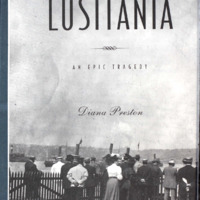-
Title
-
Lusitania: an epic tragedy.
-
Description
-
An account of the 1915 sinking of the Lusitania offers a portrait of early twentieth-century maritime history and the terrible impact of the disaster on the course of World War I.
-
Creator
-
Preston, Diana
-
Date
-
2002
-
Program air date: June 23, 2002
-
Identifier
-
2653240
-
802713750
-
Language
-
eng
-
Publisher
-
Walker & Co.
-
George Mason University. Libraries. Special Collections & Archives
-
Relation
-
Original Booknotes interview
-
Rights
-
This work may be protected by copyright laws and is provided for educational and research purposes only. Any infringing use may be subject to disciplinary action and/or civil or criminal liability as provided by law. If you believe that you are the rights-holder and object to Mason’s use of this image, please contact speccoll@gmu.edu.
-
Source
-
Brian Lamb Booknotes Collection
-
Gift of Brian Lamb, 2011.
-
Catalog record
-
Subject
-
"Lusitania (Steamship)"
-
"World War, 1914-1918--Naval operations, German."
-
"World War, 1914-1918--Naval operations--Submarine."
-
"Shipwrecks--History--20th century."
-
"World War, 1914-1918--Great Britain."
-
"World War, 1914-1918--United States."
-
Text
-
Transcription of Annotations
Notes on half title page give a breakdown of the passengers on the Lusitania who lost their lives; others refer to Captain Turner who was convinced that his ship couldn't sink and believed that speed was the best weapon against U-boats. He wouldn't order a lifeboat drill and gave the order not to lower the lifeboats, even though there were life jackets for everyone on board. The notes show that the sinking of the Lusitania lead to America's decision to go to war in 1916. A poster titled 'Remember the Lusitania' was used for recruitment purposes. A list of wealthy, famous Americans who died in the attack is also provided. p. [iii] contains notes describing various dives between 1935 and 2001 in the Irish Sea to explore the ship wreck. In 1982 e.g., one of the propellers of the Lusitania was retrieved and melted into 3500 sets of golf clubs. -- These questions and comments are noted on p. 532: "How often was Turner interviewed after sinking?" -- "Did Churchill conspire on the sinking of the L[usitania] in order to bring U.S. into the war?" -- Captain Reginald Hall could have conspired to have L. hit." -- Annotations by Brian Lamb in the margins and underlining of pertinent phrases throughout the book. -- Examples: p. 4: "Why did the British navy not provide the Lusitania with an escort? Why was the ship going so slowly on a dead straight course after receiving warnings about the presence of enemy submarines? -- What was really in her cargo hold? What were Captain Turner's "secret" orders? Why did the ship sink so quickly?"
 2653540_Preston_D.pdf
2653540_Preston_D.pdf